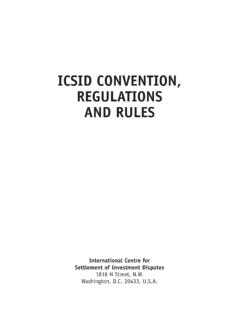Transcription of Employment tribunal powers - GOV.UK
1 February 2019 Employment tribunals powers tribunal user guidance on use and application Crown copyright 2019 This publication is licensed under the terms of the Open Government Licence except where otherwise stated. To view this licence, visit or write to the Information Policy Team, The National Archives, Kew, London TW9 4DU, or email: Where we have identified any third-party copyright information you will need to obtain permission from the copyright holders concerned. Any enquiries regarding this publication should be sent to us at: 3 Contents Introduction _____ 5 Glossary _____ 6 General principles: _____ 7 Before the hearing _____ 8 Deposit Orders _____ 8 What is a deposit order? _____ 8 What is the minimum and maximum?
2 _____ 8 Can a party be ordered to pay a substantial deposit even if they can t afford to pay? ___ 8 What happens if the deposit order is not paid? _____ 9 What if the allegation/argument is successful? _____ 9 What if the allegation/argument is unsuccessful? _____ 9 During / After the hearing _____ 10 Costs (Expenses in Scotland) / Preparation Time Orders _____ 10 What are they? _____ 10 How are they used? _____ 10 When can they be applied? _____ 10 What is the maximum value of a costs (in Scotland, expenses) order? _____ 11 How much is allowed for preparation time? _____ 11 What is needed for a costs (in Scotland, expenses) or preparation time order? _____ 11 What type of conduct may be considered for a costs (expenses) / preparation time order?
3 _____ 11 When have they been used? _____ 11 Wasted costs orders _____ 12 What are they? _____ 12 How are they used? _____ 12 What is meant by the terms improper, unreasonable or negligent? _____ 12 Where have they been used? _____ 12 What is meant by representative? _____ 12 When might such an order be made? _____ 13 powers relating to Employment law breach _____ 14 Aggravated Breach financial penalty _____ 14 What is it? _____ 14 How is it applied? _____ 14 What are aggravating features? _____ 14 4 What mitigating circumstances might a tribunal consider? _____ 15 When have they been used? _____ 15 Adjustments to compensation (Acas code of practice) _____ 16 What is it? _____ 16 What is in the code of practice? _____ 16 How is it considered in tribunals ?
4 _____ 16 What sort of things are covered by the code? _____ 16 What is meant by unreasonable? _____ 17 Introduction Feedback from people using Employment tribunals suggested there was a lack of awareness or confusion over what powers tribunals have to either act against Employment law breaches and poor behaviour in bringing or defending a claim, or the way a case is conducted, and the way those powers are applied. The aim of this document is to provide an accessible explanation of the powers available and highlight case law which illustrates how tribunals have used them. This should increase confidence that poor behaviour or conduct in bringing or defending a claim can have financial consequences and highlight how you can ask tribunals to make use of those powers .
5 It should also help provide reassurance about the purpose and limits of these powers , so that people are not dissuaded from proceeding with a claim or putting forward a defence to it (referred to commonly as presenting a response) by inaccurate information about their use. The Government is committed to ensuring people are able to resolve their disputes within the workplace rather than dealing with expense and stress of going to an Employment tribunal . Where claims do go to tribunal Government works to ensure that Employment tribunals have the case management powers they need to act against Employment law breaches or poor conduct during proceedings in line with the tribunal s overriding objectives of: ensuring that the parties are on an equal footing; dealing with cases in ways which are proportionate to the complexity and importance of the issues; avoiding unnecessary formality and seeking flexibility in the proceedings; avoiding delay, so far as compatible with proper consideration of the issues; and saving expense This guidance relates to the Employment tribunal rules as at the time of publication.
6 This means that they are applicable in England, Wales and Scotland. Advice on Employment law is available from Acas. General information on Employment tribunals can be found on and detailed information on the tribunal process is available from HM Courts & tribunals Service and in Presidential Guidance. Glossary 6 Glossary Throughout this document are references to terms that may have a slightly different meaning to their use outside of a tribunal . Party This refers to anyone who is making a claim or defending a claim, whether they are doing that themselves or by using a representative such as a lawyer. Claim A claim refers to one or more complaints that Employment law has been breached Response - A response is the defence put forward challenging the claim of Employment law breaches.
7 Claimant - The person bringing the claim Respondent The person or company defending the claim Order This is an enforceable demand by the tribunal for a party to take particular action (for example, provide information to the other party) or pay a sum of money. Judgment - This is the enforceable final tribunal decision regarding liability, compensation (remedy) or costs (in Scotland, legal expenses). ET1 - The name of the form for submitting a claim to an Employment tribunal ET3 - The name of the form used to respond to a claim made to an Employment tribunal . Deposit Orders An order made by the tribunal for a party to pay a deposit to pursue an argument as part of a claim or response. Costs Orders / Expenses Orders A costs (expenses in Scotland) order is an order by the tribunal for one side to make a payment to the other side for the legal costs of making or defending a claim.
8 Aggravated Breach Penalty A penalty payable to the state where a tribunal finds that an employer has breached a worker s rights and that the breach has one or more aggravating features Wasted Costs Orders Similar to costs orders but payable by the party s representative Uplift - An increase to the amount awarded by the tribunal General principles: 7 General principles: Employment tribunals have a variety of legal powers to help manage a case. For example, A party may make an application to the tribunal or the tribunal itself may decide on its own initiative to make an order this requires some form of action to be taken by one or both (all) parties. Orders for payment of costs (in Scotland, expenses), preparation time or wasted costs may be made on application by a party, or on the tribunal s initiative up to 28 days after the end of the case.
9 Before the decision is made the tribunal will invite the person who would have to pay (known in the tribunal rules as the paying party ) if the order was made to say why they think the order should not be made or should be for a different amount of money than that which is being asked for or In deciding whether to make a deposit, costs (in Scotland, expenses), preparation time, wasted costs, or an aggravated breach order, and if so in what amount, the tribunal may have regard to the paying party s (or, where a wasted costs order is made, the representative s) ability to pay. This consideration may be based not only on what assets the party already has (including capital or savings) but also their future ability to pay. A party may apply for a reconsideration of the tribunal s judgments.
10 A party can request that a tribunal vary or set aside an order. If a party believes that the Employment tribunal has made an error in law, they can appeal to the Employment Appeal tribunal . Before the hearing 8 Before the hearing Claims and responses sent to the Employment tribunal on ET1 and ET3 forms are considered before the hearing in a sift process. There is a further point offering an opportunity before the need for a full hearing has been determined to test the merit of the claim or response as part of what is known as a preliminary hearing. Deposit Orders What is a deposit order? A deposit order may be made by the Employment tribunal at a preliminary hearing if it considers that an allegation or argument made in the claim or response has little reasonable prospect of success.
















